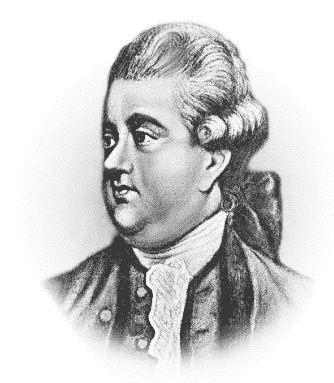The Life of Gibbon
- Born in England in 1737

- Eldest and only surviving child of seven.
- Constantly sick as a child, considered a runt.
- Neglected by his mother, raised by her sister (his aunt)
- Raised as Protestant, then turned Catholic in his youth.
- Traveled around Europe much in his twenties and thirties
- Fell in love with Suzanne Churchad but never married, no kids.
- Despite small stature, joins the militia in his twenties and attains the rank of captain.
- Educated at Magdalin college
- Settled in London, where he began his most famous book, The Decline and Fall of the Roman Empire after his visit to Rome
- Published the first volume in 1776
- Sat in House of Commons between 1774-1783
- Finished Decline and Fall in 1788
- Died in 1794
The Decline and Fall of the Roman Empire
- A history of Rome from the death of Marcus Aurelius in 1453
- Six volumes
- Very controversial on the rise of Christianity, saying that it was one of the causes of the downfall of Rome.
- Encouraged secularism, which caused many people to hate Gibbon
- First historical work written with style instead of simply stating facts
- Often considered the greatest historical work written in English
Beliefs
- Secularism
- The past provides wisdom, we can learn about the present and future through it
- Reason above religion
- Against tyranny, believed in moderation and tolerance
- History should sound pleasing
- Rationalist, not a fan of supernatural values
- Believed in progress
- “Let us read with method , and propose to ourselves an end to which our studies may point. The use of reading is to aid us in thinking”
- Did not believe in baths
Quotes
- “Books are those faithful mirrors that reflect to our minds of sages and heroes”
- “Corruption , the most infallible symptom of constitutional liberty”
- “History is little more than the register of the crimes, follies and misfortunes of mankind”
- “Of the various forms of government which have prevailed in the world, an hereditary monarchy seems to present the fairest scope for ridicule”
Impacts on society
- Helped along enlightened thinking
- Helped inspire the idea of secularism
- Discouraged absolutism
- Helped put higher stock in ability to reason
- Brought the idea of history and analysis of it into society
